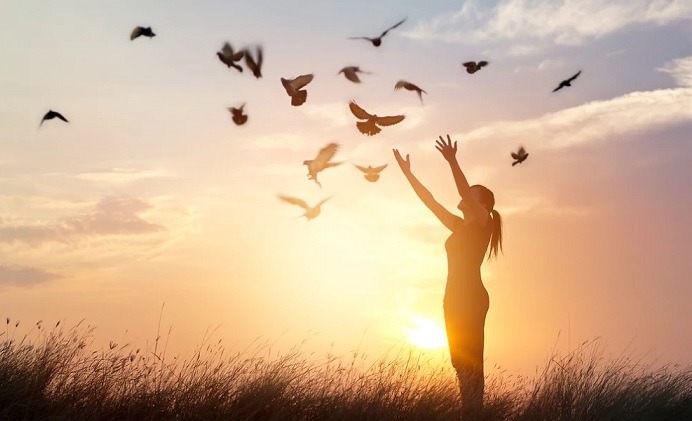Spirituality
What Does ‘Higher Power’ Mean When You Don’t Believe in God?
by Aurora McCausland
There are a lot of different aspects to health. When you think of a healthy being, you generally just think about the health you can see on the surface, meaning, they’re a disease-free individual with an average to strong immune system. Physical health is an important part of health, but it’s not the only aspect of health. A healthy person is not only physically healthy, but also mentally, emotionally, and spiritually.
Spiritual Does Not Always Equal Religious
Atheist and agnostic individuals will read the above line about spiritual health, and roll their eyes. No, this isn’t about God. In fact, this really isn’t about God. Spirituality doesn’t have anything to do with someone’s relationship with God; it only does when someone chooses to connect spirituality with their personal religion. That is a personal choice, and therefore spirituality does not require a blanket belief in God.
What Is Spirituality?
“The quality of being concerned with the human spirit or soul as opposed to material or physical things”. Simply put, spirituality has nothing to do with God; it means being connected with yourself. Everyone, no matter their religious beliefs, can benefit from connecting with their spiritual self a little bit more.
What Is a Higher Power?
Believing in a higher power doesn’t inherently mean believing in God. If God is your higher power, then that’s what suits you. Many people simply believe in something unknown or unimaginable. That may seem a little vague, but for some people, they find comfort in the thought of there being some unknown being, not necessarily God, that is watching out for them—a guardian angel, maybe of a loved one who passed, or just something to believe in and rely on when physical trials and tasks become a little too heavy to handle on your own.
How to Connect with Your Spiritual Side?
For some people, having grown up in a religious household, the idea of connecting with their spiritual side is a very familiar idea, something they practice every Sunday. For those who grew up in organized religion, only to later reject those practices, it may be hard to think about becoming spiritual once again. And someone who has never felt spiritual a day in their life will feel equally lost. Spirituality isn’t for everyone; but if there’s a potential to bring you more peace and a more directed path for your life, it’s worth a try, isn’t it?
Your first step, is to set up an intention. This is as simple as acknowledging that you want to be more spiritual. Simply say to yourself that you want to connect with your spiritual side. Or write your intention in a journal. Even just telling a friend about your intentions is the perfect way to start your spiritual journey.
Provide your mind with the materials it needs to explore this new path. Read everything that you can get your hands on that seems like it may help you. TED talks and uplifting podcasts are also a great way to expand your spiritual self.
Take a few moments every day to be still. For some people, this comes in the form of meditation. Others call it mindfulness. You don’t have to sit and try to entirely clear your mind. But for 15 minutes, listen to a calming track, and think of peaceful things. There are lots of apps and guides to meditation and mindfulness for beginners that you may find helpful.
Find a tribe. Spirituality isn’t necessarily a solitary activity. Your spirituality will thrive if you find a tribe. This doesn’t mean you have to find a church to commit to and go to every single Sunday. Go to firesides, workshops, and classes. Find like-minded people, and spend time with them.
Experimentation is probably one of the most important steps to spirituality. It’s a fluid thing, always changing. Try new things, always experience new things as they come to you and try to find the joy in them. Leave no stone unturned. If something piques your interest, investigate and pursue it. You won’t know if it’s beneficial to you if you don’t try it!
About the Author
Aurora McCausland is a professional writer and blogger enjoying life in Salt Lake City, Utah. Although she spends the majority of her time writing, when she’s not, you can find her cuddling her dog, hiking with her husband, or trying to find the perfect coffee shop. You can see more of her writing on her website www.auroramccausland.com or check her out on Instagram, @auroramccausland.




